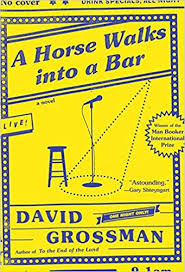Few Smiles Here
Comedy clubs are often dark places. We look for a chuckle, laughs, a good time – and more often than not, we see comedians mining their pain for humor. That sort of emotional mining is tough, dangerous work. Laughter can be a bitter reward.
David Grossman’s A Horse Walks Into a Bar is a searing novel about comedy, performance, and the legacy of pain. It’s a brilliant book and well worthy of the Booker Prize. It is narrator is a retired judge, Avishai, who was asked by an aging comedian – a former childhood friend – to attend the friend’s stand up show. The comedian, Dov Greenstein, asks that Avishai come to “really see him.” The judge reluctantly agrees. He is a less than perfect narrator, and we work through his perspective as he recounts the show, his feelings about it, the audience’s reactions to it, and the story of Dov as he knew him. The novel takes place over a couple of hours in a second-tier comedy club – a dive – in a small Israeli city. Everything is down-market and headed toward decrepitude.
Dov Greenstein is short, unattractive, and in tremendous psychological pain. Through jokes, narration, questions, and soliloquies, we learn of his childhood and the trauma that shaped him. He has lived his life in a callous world, bereft of real human warmth and understanding. Dov’s acerbic humor is an accurate reflection of his environs. He turns his intelligence, and his interrogatory, on himself. The show spirals out of control, becoming less comedy and more autobiographical confessional. The audience leaves but a few stragglers stay, trapped and seemingly unable to look away. As the judge learns and remembers, we put the pieces together. We readers, like the judge, are complicit in the pain and creativity of Dov’s act. A Horse Walks Into a Bar is powerful and unsettling literature.
David Potash